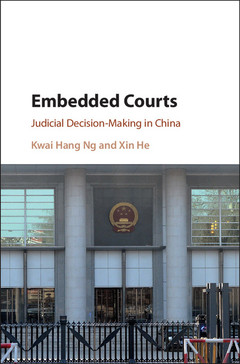Description
Embedded Courts
Judicial Decision-Making in China
Authors: Ng Kwai Hang, He Xin
A study of the decision-making process of Chinese courts and the non-legal forces and regional factors that influence judicial outcomes.
Language: English
Subject for Embedded Courts:
Approximative price 127.71 €
In Print (Delivery period: 14 days).
Add to cart
Embedded Courts
Publication date: 10-2017
Support: Print on demand
Publication date: 10-2017
Support: Print on demand
Approximative price 45.81 €
In Print (Delivery period: 14 days).
Add to cart
Embedded Courts
Publication date: 12-2018
Support: Print on demand
Publication date: 12-2018
Support: Print on demand
Description
/li>Contents
/li>Biography
/li>
Embedded Courts is laden with tension. Chinese courts are organized as a singular and unified system yet grassroots courts in urban and rural regions differ greatly in the way they use the law and are as diverse as the populations they serve. Based on extensive fieldwork and in-depth interviews, this book offers a penetrating discussion of the operation of Chinese courts. It explains how Chinese judges rule and how the law is not the only script they follow - political, administrative, social and economic factors all influence verdicts. This landmark work will revise our understanding of the role of law in China - one that cannot be easily understood through the standard lens of judicial independence and separation of powers. Ng and He make clear the struggle facing frontline judges as they bridge the gap between a rule-based application of law and an instrumentalist view that prioritizes stability maintenance.
1. Chinese courts as embedded institutions; 2. The daily rounds of frontline judges; 3. Cohorts of judges; 4. Administrative embeddedness - the vertical hierarchy of control; 5. Political embeddedness - courts as a stability maintenance agency; 6. Social embeddedness - ties from within and from without; 7. Economic embeddedness - the political economy of court finances; 8. Conclusion; 9. Methodological appendix.
Kwai Hang Ng is Associate Professor of Sociology at the University of California, San Diego. He has written a series of articles (with Xin He) on different aspects of the Chinese grassroots courts, addressing topics including courtroom discourse, mediation, criminal reconciliation, domestic violence, and divorce petitions. Ng's previous book, The Common Law in Two Voices: Language, Law, and the Postcolonial Predicament in Hong Kong (2009), was a recipient of a Distinguished Book Award from the American Sociological Association's Sociology of Law Section in 2010.
Xin He is Professor and Director of Chinese and Comparative Law at the School of Law, City University of Hong Kong. He has published more than thirty articles in the leading journals in the fields of law and society, comparative law, and the Chinese legal system. His previous Visiting Professorships include those at New York University School of Law, University of Illinois College of Law, and Southwestern University of Finance and Economics, China.
Xin He is Professor and Director of Chinese and Comparative Law at the School of Law, City University of Hong Kong. He has published more than thirty articles in the leading journals in the fields of law and society, comparative law, and the Chinese legal system. His previous Visiting Professorships include those at New York University School of Law, University of Illinois College of Law, and Southwestern University of Finance and Economics, China.
© 2024 LAVOISIER S.A.S.
These books may interest you

Maritime Law and Practice in China 365.50 €

Maritime Law and Practice in China 293.12 €


